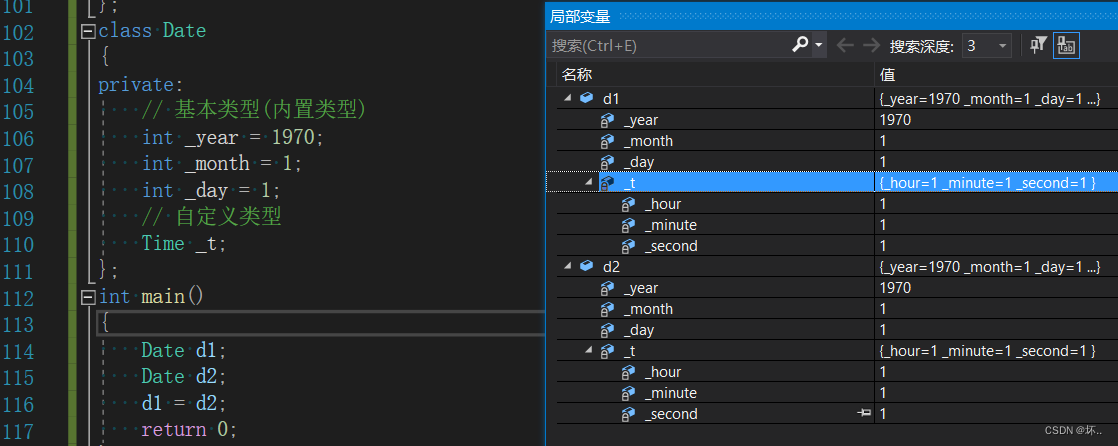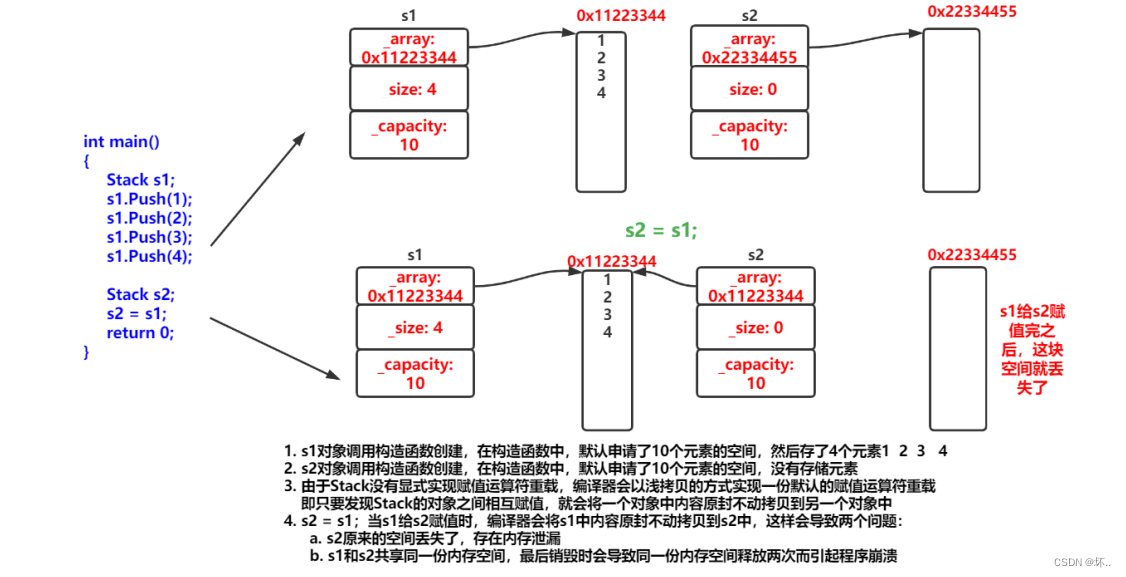目录
一、运算符重载
1.1概念
C++为了增强代码的可读性引入了运算符重载,运算符重载是具有特殊函数名的函数。也具有其返回值类型,函数名字以及参数列表,其返回值类型与参数列表与普通的函数类似。
函数名字为:关键字operator后面接需要重载的运算符符号。
函数原型:返回值类型 operator操作符(参数列表)
我们可以声明下列函数,令其表示下述运算符:
+ - * / % ^ & | ~ ! = < > += -= *= /= %= ^= &= |= << >> >>=
<<= == != <= >= && || ++ -- ->* , -> [] () new new[] delete delete[]
注意: 用户不能定义下列运算符:
:: 作用域解析 .成员选择 .*通过指向成员函数的指针访问成员 sizeof对象的尺寸 alignof对象的对齐方式 typeid对象的 type_info ?:条件表达式
1.2举例
1.不能通过连接其他符号来创建新的操作符:比如operator@
2.重载操作符必须有一个类类型参数
下面以一个日期类为例重载运算符< :
#include<iostream>
using std::cout;
using std:: cin;
class Date {
public:
Date(int year, int month ,int day)
{
_year = year;
_month = month;
_day = day;
}
//private:
int _year;
int _month;
int _day;
};
// 这里会发现运算符重载成全局的就需要成员变量是公有的,那么问题来了,封装性如何保证?
// 可以友元解决,或者干脆重载成成员函数。
bool operator>(const Date& d1 ,const Date& d2)
{
if (d1._year > d2._year)
{
return true;
}
else if (d1._year == d2._year && d1._month > d2._month)
{
return true;
}
else if (d1._year == d2._year && d1._month == d2._month && d1._day > d2._day)
{
return true;
}
return false;
}
int main()
{
Date d1(2023, 10, 23);
Date d2(2022, 11, 12);
cout << (d1 > d2);
}3.用于内置类型的运算符,其含义不能改变,例如:内置的整型+,不能改变其含义
4.作为类成员函数重载时,其形参看起来比操作数数目少1,因为成员函数的第一个参数为隐
藏的this
因此改写上述代码为:
#include<iostream>
using std::cout;
using std::cin;
class Date {
public:
Date(int year, int month, int day)
{
_year = year;
_month = month;
_day = day;
}
//实际上bool operator>(Date* this,const Date&d)
bool operator>(const Date& d)
{
if (_year > d._year)
{
return true;
}
else if (_year == d._year && _month > d._month)
{
return true;
}
else if (_year == d._year && _month == d._month && _day > d._day)
{
return true;
}
return false;
}
private:
int _year;
int _month;
int _day;
};
int main()
{
Date d1(2023, 10, 23);
Date d2(2022, 11, 12);
cout << (d1 > d2);//编译器自动转换为operator>(d1,d2)
}二、赋值运算符重载
赋值运算符=重载是类的6个默认成员函数之一。用户没有显式实现时,编译器会生成一个默认赋值运算符重载,以值的方式逐字节拷贝。
2.1概念
2.1.1. 赋值运算符重载格式
参数类型:const T&,传递引用可以提高传参效率
返回值类型:T&,返回引用可以提高返回的效率,有返回值目的是为了支持连续赋值
检测是否自己给自己赋值
返回*this :要复合连续赋值的含义
class Date
{
public :
Date(int year = 1900, int month = 1, int day = 1)
{
_year = year;
_month = month;
_day = day;
}
Date (const Date& d)
{
_year = d._year;
_month = d._month;
_day = d._day;
}
Date& operator=(const Date& d)//重载运算符 =
{
if(this != &d)
{
_year = d._year;
_month = d._month;
_day = d._day;
}
return *this;
}
private:
int _year ;
int _month ;
int _day ;
};
int main()
{
Date a1(2021,11,22);
Date a2;
Date a3;
c=b=a;
return 0;
}//重载运算符 =
//返回引用可以使 = 进行连续赋值
Date& operator=(const Date& d)这里编译器 编译时是 Date& operator=(Date* this,const Date& d)
{
if(this != &d)
{
_year = d._year;
_month = d._month;
_day = d._day;
}
return *this;// *this 返回的是类对象的标识名
}2.2 赋值运算符只能重载成类的成员函数不能重载成全局函数
class Date
{
public:
Date(int year = 1900, int month = 1, int day = 1)
{
_year = year;
_month = month;
_day = day;
}
int _year;
int _month;
int _day;
};
// 赋值运算符重载成全局函数,注意重载成全局函数时没有this指针了,需要给两个参数
Date& operator=(Date& left, const Date& right)
{
if (&left != &right)
{
left._year = right._year;
left._month = right._month;
left._day = right._day;
}
return left;
}
// 编译失败:
// error C2801: “operator =”必须是非静态成员原因:赋值运算符如果不显式实现,编译器会生成一个默认的。此时用户再在类外自己实现
一个全局的赋值运算符重载,就和编译器在类中生成的默认赋值运算符重载冲突了,故赋值
运算符重载只能是类的成员函数。
2.3默认赋值运算符重载
用户没有显式实现时,编译器会生成一个默认赋值运算符重载,以值的方式逐字节拷贝。注
意:内置类型成员变量是直接赋值的,而自定义类型成员变量需要调用对应类的赋值运算符
重载完成赋值。
下面举一个例子来验证一下:
class Time
{
public:
Time()
{
_hour = 1;
_minute = 1;
_second = 1;
}
Time& operator=(const Time& t)
{
if (this != &t)
{
_hour = t._hour;
_minute = t._minute;
_second = t._second;
}
return *this;
}
private:
int _hour;
int _minute;
int _second;
};
class Date
{
private:
// 基本类型(内置类型)
int _year = 1970;
int _month = 1;
int _day = 1;
// 自定义类型
Time _t;
};
int main()
{
Date d1;
Date d2;
d1 = d2;
return 0;
}
可以看到d1和d2对象中自定义类型Time成员中的变量_hour,_minte,_second都被完成赋值。
// 这里会发现下面的程序会崩溃掉?这里就需要我们以后讲的深拷贝去解决。
typedef int DataType;
class Stack
{
public:
Stack(size_t capacity = 10)
{
_array = (DataType*)malloc(capacity * sizeof(DataType));
if (nullptr == _array)
{
perror("malloc申请空间失败");
return;
}
_size = 0;
_capacity = capacity;
}
void Push(const DataType& data)
{
// CheckCapacity();
_array[_size] = data;
_size++;
}
~Stack()
{
if (_array)
{
free(_array);
_array = nullptr;
_capacity = 0;
_size = 0;
}
}
private:
DataType *_array;
size_t _size;
size_t _capacity;
};
int main()
{
Stack s1;
s1.Push(1);
s1.Push(2);
s1.Push(3);
s1.Push(4);
Stack s2;
s2 = s1;
return 0;
}
注意:如果类中未涉及到资源管理,赋值运算符是否实现都可以;一旦涉及到资源管理则必
须要实现。
三、前置++(--)和后置++ (--)重载
class Date {
public:
Date(int year, int month ,int day)
{
_year = year;
_month = month;
_day = day;
}
// 前置++:返回+1之后的结果
// 注意:this指向的对象函数结束后不会销毁,故以引用方式返回提高效率
Date& operator++()
{
_day += 1;
return *this;
}
// 后置++:
// 前置++和后置++都是一元运算符,为了让前置++与后置++形成能正确重载
// C++规定:后置++重载时多增加一个int类型的参数,但调用函数时该参数不用传递,编译器
//自动传递
// 注意:后置++是先使用后+1,因此需要返回+1之前的旧值,故需在实现时需要先将this保存
//一份,然后给this+1
// 而temp是临时对象,因此只能以值的方式返回,不能返回引用
Date operator++(int)
{
Date temp(*this);
_day += 1;
return temp;
}
private:
int _year;
int _month;
int _day;
};
int main()
{
Date d;
Date d1(2022, 1, 13);
d = d1++; // d: 2022,1,13 d1:2022,1,14
d = ++d1; // d: 2022,1,15 d1:2022,1,15
return 0;
}






 本文深入探讨了C++中的运算符重载,包括赋值运算符的特性和重载规则,以及自增自减运算符的前置和后置版本。通过实例说明了如何在类中正确实现这些运算符功能。
本文深入探讨了C++中的运算符重载,包括赋值运算符的特性和重载规则,以及自增自减运算符的前置和后置版本。通过实例说明了如何在类中正确实现这些运算符功能。














 1193
1193











 被折叠的 条评论
为什么被折叠?
被折叠的 条评论
为什么被折叠?








